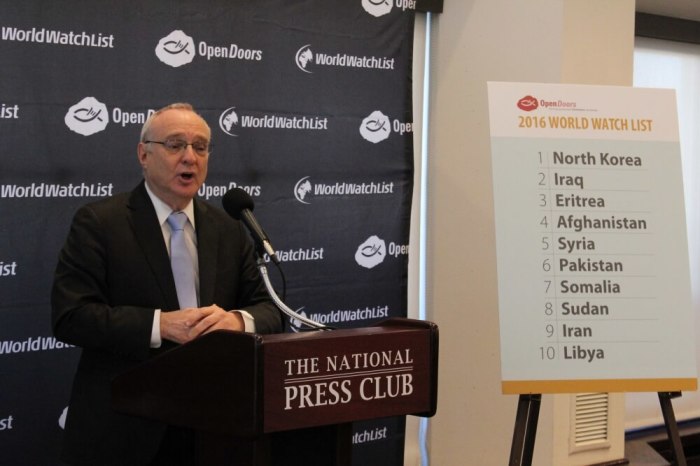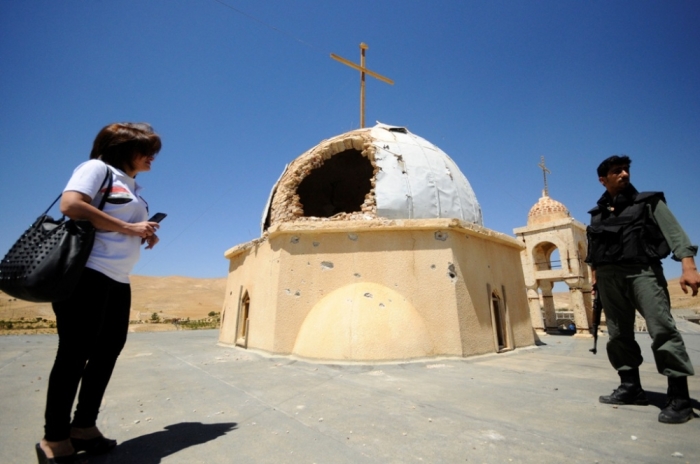Christian 'Genocide' Designation Won't Affect US Response to ISIS, Religious Freedom Amb. Says

WASHINGTON — The U.S. State Department's Ambassador at-Large for International Religious Freedom David Saperstein argued Wednesday that calling the Islamic State's atrocities against Christians "genocide" would make no difference in how the Obama administration is responding to the human rights crisis.
While a number of human rights groups have pressured the administration to label IS' persecution of Christians and other religious minorities as "genocide," Saperstein appeared at an Open Doors ministry press conference introducing the 2016 World Watch List and was asked if he thinks it is "important" for the government to recognize the plight of Christians in Iraq and Syria as "genocide."
As the Obama administration has already recognized IS' persecution of Yazidis as genocide and failed to do the same for Christians, Shiite Muslims and others who oppose IS' radical theology, Saperstein providing a long-winded reasoning why labeling the plight of Christians as genocide would not have any effect on the government's current response to IS.
"Had we a year ago made a determination about genocide crimes against humanity, it would have resulted in what we are doing [now]," Saperstein, who is a rabbi, said. "You phrase the question, 'Is there significance?' 'Is their importance?' We are doing what we would have done regardless of whether the designation had been made or not."

Some who are calling for the U.S. to label the Christian plight as genocide, such as Rep. Jeff Fortenberry, R-Neb., argue that such a designation is "the first priority of raising international consciousness" about the suffering faced by hundreds of thousands of people who have fled their homes or been killed and also paves the way for stronger international intervention.
As the Christian population in Iraq and Syria continues to decline and many believe that it could soon be extinct, Saperstein explained that moral argument that labeling the persecution as genocide is needed to affirm the suffering of those communities is a "complicated issue" for the administration.
"On the other hand, on affirming the suffering of what people are going through and their sense of what that suffering is as an important moral step as well, that is a much more complicated issue for us in light of the technical requirements of genocide when people feel they are being subject to genocide," Saperstein wrote. "What we want to do is to talk about what we are doing on behalf of these communities."
Dr. Richard Land, who was a member of the U.S. Commission on International Religious Freedom for nearly a decade and is now the executive editor of The Christian Post, said in an interview Thursday that Saperstein's comments only continue the Obama administration's theme of not "calling things what they actually are."
"They refused to call radical Islamic jihadism, radical Islamic jihadism. It is certainly true that not all Muslims are extremists, but all the radical Islamic jihadists are Islamic," said Land, who's also the president of the Southern Evangelical Seminary. "So, if something is genocidal, then it should be called 'genocide.' Why avoid telling the truth and speaking plainly?"
Saperstein also told the press conference that the U.S. response to IS has been much better than that of the international responses to the humanitarian crises' in Rwanda and Darfur.
"We are already doing things that substantially exceed what the international community did in those situations," Saperstein added. "So, there would have been no difference in terms of the consequence of this."
Although Saperstein asserted that the response to IS has been better than the response to Rwanda and Darfur, Land argued that it doesn't take much for the international response to be better than the responses in those past situations.
"Rwanda was a horrific failure of the West to uphold literal human values and for [President] Bill Clinton, it is the single biggest regret of his administration," Land contended. "When it comes to Darfur, the intervention by the U.S., or the the extent that there has been one, has been too little, too late, and is another abject failure to uphold the literal norms of civilization."



























